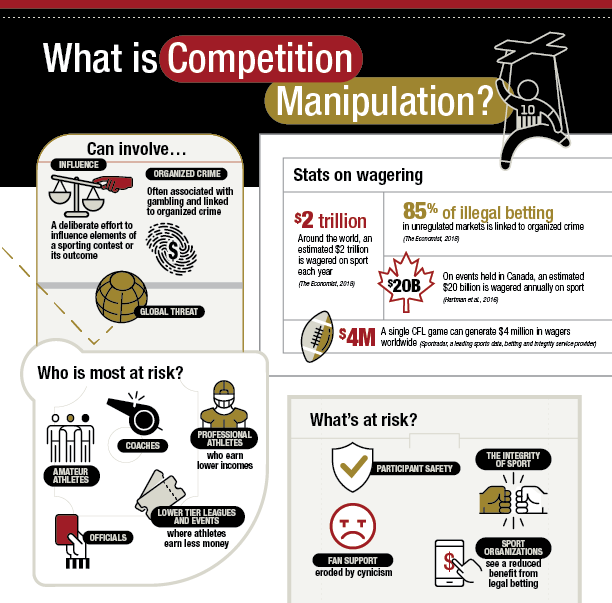The CCES looks forward to launching the Canadian Program to Prevent Competition Manipulation in the coming weeks. In the meantime, we invite you to learn more about competition manipulation throughout this website section.
Competition manipulation is recognized as a major threat to the integrity of sport on a global scale and without measures in place to manage sport betting and corruption, it will continue to grow. The CCES is working with trusted partners to protect the integrity of Canadian sport and to educate the sport community about the risks associated with such activities.
What is competition manipulation?
Competition manipulation is a deliberate effort to influence elements of a sporting contest or its outcome, usually for financial gain. It is a global threat that is often associated with gambling and linked to organized crime, and it’s a growing issue in Canada.
Competition manipulation typically occurs when a player, game official, coach or other staff is compromised through the influence of another party, known as a fixer. The influence may take the form of financial bribes and threats – such as physical harm – and often aim to exploit the athlete’s vulnerabilities.
Once a fix is in place, people who are aware of it may wager unusually large sums on the expected outcome of the manipulated event, which results in substantial winnings. In such a case, legal bettors may suffer financial losses due to the fraudulent, unexpected results.
Match-fixing is often linked to gambling and organized crime on a global scale, although regulated gambling markets can also be subject to betting-related fraud. Compared to unregulated betting markets in which bookmakers operate with limited oversight, regulated markets are typically managed by government and provide better opportunities to monitor and address issues related to match manipulation.
The effects of competition manipulation can erode the integrity of the sport system. If spectators believe the outcome of competition is predictable and predetermined, they may lose trust in the sport and become uninterested.
How much money is at stake?
A significant amount of money is wagered on sport every year. A large percentage of these wagers are linked to illegal betting in unregulated markets, which is often tied to competition manipulation.
- Around the world, an estimated $2 trillion dollars is wagered on sport each year, 85% of which is illegal betting in unregulated markets that is linked to organized crime (The Economist, 2018).
- An estimated $20 billion is wagered annually on sport events held in Canada (Hartman et al., 2016).
- A single Canadian Football League game can generate $4 million in wagers worldwide (Sportradar, 2019, leading sports data, betting and integrity service provider).
Who’s at risk?
People who manipulate competitions, known as fixers, often target people in these categories:
- Professional and amateur athletes,
- Officials,
- Coaches, and
- Lower-tier leagues and events.
What’s happening in Canada?
There are comparatively few concrete examples of match fixing in North America, but experts assert that it is a growing concern.
In 2012, a news story alleged that a player in the Canadian Soccer League (CSL) accepted a bribe to fix a match in 2009. It was eventually revealed that the entire CSL was affected, including the manipulation of as many as 42% of games in the league.
It’s estimated that Canadians are spending $10 billion dollars annually through illegal sports betting operations controlled by organized crime, whereas legal provincial sports lottery products see only $500 million. (Canadian Gaming Association).
Canada is limited in its ability to prosecute match fixing because there are no specific provisions in the Criminal Code that prevent it, nor is there even a mention in the Code of offshore sports betting.
How is the CCES addressing competition manipulation?
In response to the growing threat of match manipulation in Canada, the CCES is engaged in several activities that aim to protect the integrity of sport in Canada and bolster the country’s role and reputation in this area on the international stage.
- The CCES supported Bill C-218 ‐ An Act to amend the Criminal Code (sports betting). The bill, which became law in August 2021, provides a regulatory framework to manage single-event sport betting in Canada, consumer protections, and increased economic opportunities. Sports betting is managed by provincial and territorial governments.
- The CCES and the Canadian Olympic Committee struck an Exploratory Working Group on Match Manipulation composed of representatives from national and multi-sport organizations. The group’s focus is understanding the risks associated with competition manipulation in Canada and developing resources to protect the Canadian sport community, including a competition manipulation policy template for sport organizations (see below).
- The CCES and McLaren Global Sport Solutions Inc. (MGSS) hosted the first-ever Canadian symposium addressing the issues of match manipulation and gambling in sport in April 2019.
- The White Paper on Competition Manipulation and Gambling: Growing Threats to Canadian Sport and the Gaming Industry offers five urgent recommendations, including examples of practices that have been implemented internationally.
Resources
- Competition Manipulation Policy template for Canadian sport organizations
- What is Competition Manipulation? infographic
- White Papers in Response to the International Symposiums:
- International Olympic Committee: Prevention of Competition Manipulation
- The Convention on the Manipulation of Sports Competitions (the Macolin Convention)
- SIRC Blog: Match Manipulation and Gambling in Sport
- Canadian Gaming Association Sports Betting Fact Sheet
- Bill C-218 -- Safe and Regulated Sports Betting Act
